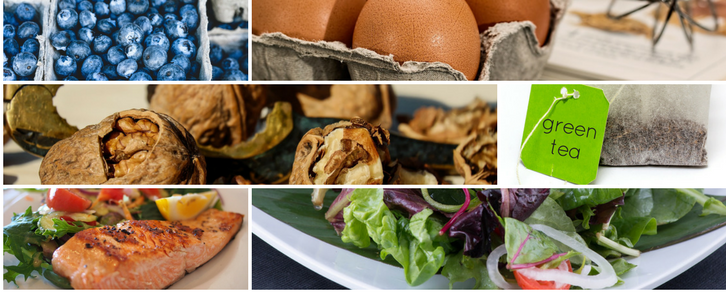6 Foods For Better Brain Health
By Meredith Kimple
While some of us pursue healthier choices for a fit physique, many of us are also concerned with keeping our bodies functioning at their best. A part of this maintenance should include eating foods that support our brain health.
In our youth, we are blessed with excellent cognitive function naturally, but as we age, we must actively bolster the brain’s faculties to maintain sharpness. Certain foods have been linked to memory improvement and are beneficial to our body’s overall wellness; by adding them to our diet, we may be able to stave off cognitive decline and preserve our mental health well into old age.
So, what are these exotic miracle foods?
It may disappoint you to learn that they are things you already eat! And even if you don’t eat them now, they are easily obtained:
- Blueberries
There have been a number of studies that show the positive effect these little berries have on cognitive function. Blueberries are full of compounds called anthocyanins, which promote anti-inflammation in the body; research suggests that blueberries help boost neural signaling in the brain and may even improve short-term memory loss.
And the best part is, they can be added to just about anything. Put them on your morning cereal or oatmeal, add them to salads and smoothies, or just grab a handful for a refreshing afternoon snack.
- Fish
A study at the University of Pittsburgh found that participants who ate baked or broiled fish at least once a week had brains with a larger volume in the areas associated with memory. Omega-3 fatty acids are prevalent in oily fish, like salmon, and have been found to aid in the memory of facts and object recognition. Omega-3 is also great for heart health, so incorporating fish into your diet can bring twice the benefits.
Fresh fish that is baked or broiled is preferable to fried, but try swapping out a meat dish for fish at least once a week.
- Walnuts
These meaty nuts even resemble a human brain! Packed with Vitamin E, they may help slow or prevent cognitive decline. A UCLA study found that adults who ate walnuts showed consistently greater cognitive function than those who did not, regardless of ethnicity, gender, and age. While more research is needed to verify those results, walnuts are a great source for healthy fat, and like salmon, contain Omega-3, making them beneficial for heart health as well.
- Leafy Greens
Bad news for those of us who loathe spinach.
Whether it’s kale, spinach, or collards, leafy greens are bursting with nutrients like Vitamin K and beta-carotene that help slow cognitive decline. A recent study showed that eating as few as two servings of leafy greens a day gave participants the cognitive function of someone 10 years younger, compared to those participants who ate none.
And if you have a real aversion to your greens, never fear. These powerful nutrients can also be found in brightly colored fruits and vegetables! Still, trying to add more greens to your meals is highly recommended.
- Green Tea
We know that green tea is full of antioxidants, but recently a university in China conducted a study to show that it may in fact be beneficial for spatial learning and memory too. Green tea contains an antioxidant called ECCG (epigallocatechin-3 gallate) that produces highly adaptive neural progenitor cells. This cell production seems to improve both impaired spatial memory and object recognition. Green tea may therefore be helpful in slowing or even improving aspects of cognitive degeneration.
Brewed green tea has stronger properties than canned or bottled, and is very easy to find. If you’re someone who drinks coffee or black tea frequently, try swapping it out for green tea from time to time. It will give you energy while helping you preserve cognitive function.
- Eggs
Eggs have long been dubbed “brain food.” They contain a large amount of choline, a nutrient that aids in the communication between cells in the brain and the body. Choline can help to preserve brain chemistry as the body ages, which can protect against cognitive decline.
Vegetable omelets are a great way to incorporate multiple brain foods into one simple dish.
These are just a handful of the foods that can provide our brains with some protection against cognitive decline; other foods that can promote healthy cognitive aging include tomatoes, broccoli, avocados, and dark chocolate.
Planning meals in advance and having these foods handy can ensure that we eat in a way that is not just beneficial to our bodies, but to our minds. And these are not recommended to seniors only; there is some evidence that the longer we eat brain-healthy foods, the stronger our guard against cognitive decline. By incorporating these nutrients into our diets, we and our older loved ones can take an active role in maintaining our cognitive function for as long as possible.
None of the foods in this list are miracle workers, and none are foolproof drugs that can guarantee protection. Research has yet to provide answers that can satisfy all of our questions, but it confirms what has been previously theorized; it is no coincidence that many of the foods that are beneficial to our brains are also good for our hearts, and for our overall health.
So as we enter a new year, consider adding these brain-empowering foods to your diet, rather than focusing only on what you can remove.



